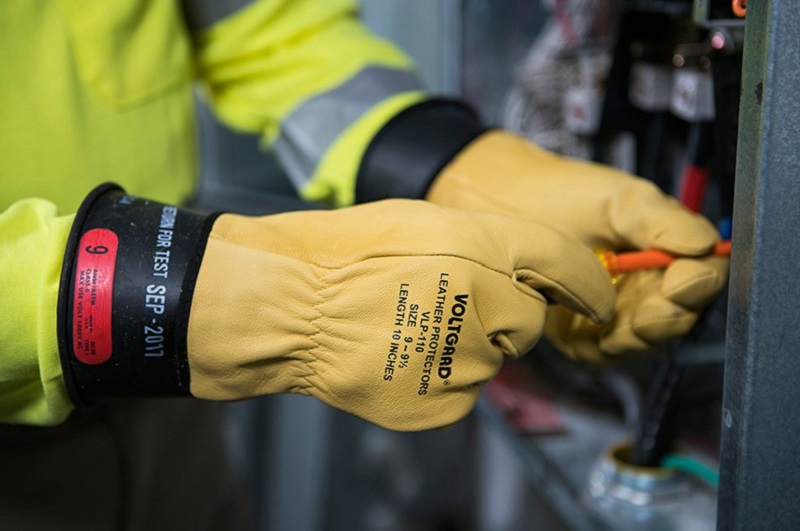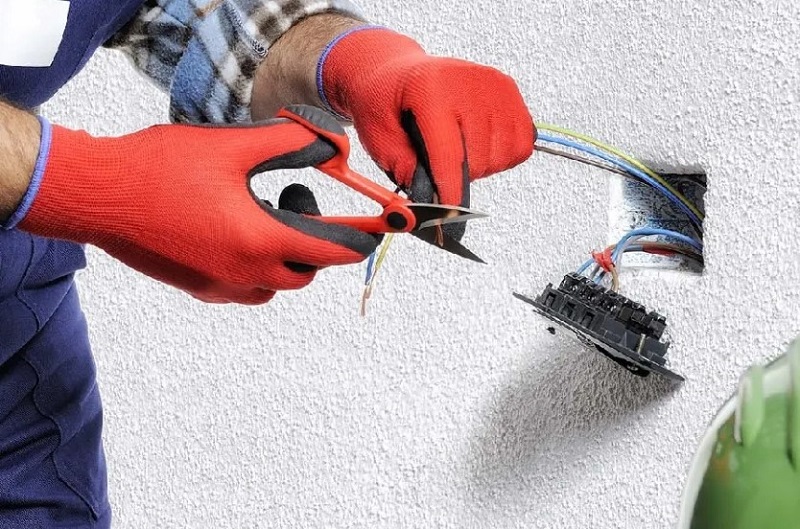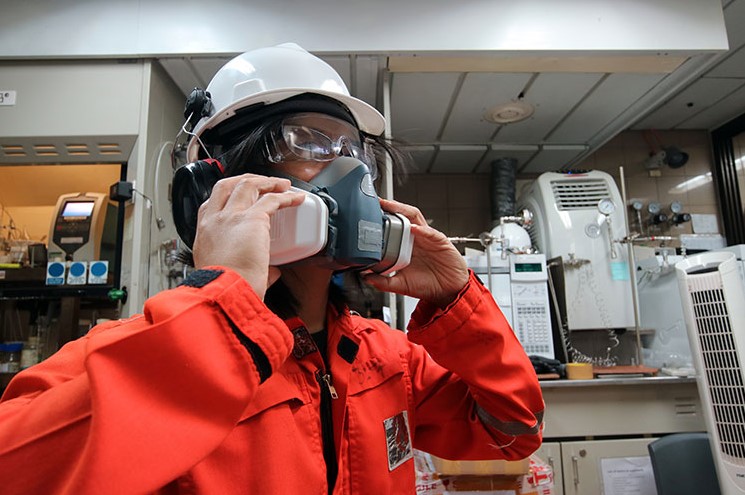Have you ever wondered about the significance of those iconic rubber gloves worn by electricians? Well, it’s not just a fashion statement; these gloves play a vital role in ensuring safety and efficiency on the job site.
In this blog post, Derosa Electric will dive into the reasons why electricians wear rubber gloves, discuss various types and their specific uses, and explore other essential protective gear for those working with electricity.
Key Takeaways
- Rubber gloves provide protection against electric shocks, insulation from live wires, and ensure compliance with safety standards while working with electricity.
- Different types of rubber gloves are available for electricians based on their voltage requirements: Class Zero, Class 1, and Class 2 Rubber Gloves.
- Electricians must wear other protective gear such as rubber boots, face shields, and protective clothing to ensure complete protection from electrical hazards.
- Proper use and maintenance of all personal protective equipment is crucial in preventing accidents at work. Adequate training and certification programs should be undertaken by every electrician before handling any electrical work.
The Importance Of Wearing Rubber Gloves As An Electrician
Rubber gloves are essential for electricians because they provide protection from electric shocks, insulate them from live wires, and ensure compliance with safety standards.
Protection From Electric Shocks
One primary reason electricians wear rubber gloves is to provide protection against electric shocks. Rubber, a natural insulator, acts as a barrier between the electrician and electrical currents, preventing the flow of electricity through their bodies.
Additionally, these specialized gloves improve grip and reduce hand fatigue when handling tools and equipment for extended periods. This not only increases work efficiency but also minimizes the risk of dropping heavy tools that could lead to further accidents in an already hazardous environment.
Insulation From Live Wires
Rubber gloves provide a crucial barrier of protection for electricians against live wires. When working with electrical wiring, the potential for an electrical shock is always present.
Electricians wear rubber gloves to prevent direct contact between their hands and the current-carrying wires.
Without proper insulation, electricity can pass through a person’s body, causing serious injury or even death. The use of insulated gloves ensures that any stray currents are directed around the outside of the glove rather than through the wearer’s hand – effectively providing a layer of protection between electricians and any electrical hazards they may encounter.
Compliance With Safety Standards
Compliance with safety standards is a key reason why electricians wear rubber gloves. Electrical work poses many hazards, and there are specific regulations that must be followed to ensure the safety of both the electrician and those around them.
Wearing rubber gloves provides an important barrier between the current and the human body, reducing the risk of electrical shock. Following these guidelines also ensures that any electrical work is performed correctly, minimizing damage or injury caused by improper installations or repairs.
Types Of Rubber Gloves For Electricians
Electricians typically use three types of rubber gloves for protection: Class Zero Rubber Gloves, which provide the highest level of voltage protection; Class 1 Rubber Gloves, suitable for voltages up to 7.5 kV; and Class 2 Rubber Gloves, designed for working with voltages up to 17 kV.
Class Zero Rubber Gloves
Class Zero rubber gloves are the most protective type of rubber gloves that electricians can wear. They offer protection for up to 1,000 volts of electrical current and feature a high level of dielectric strength.
Electricians who work with live wires or in hazardous environments where there is a high risk of electrical shock must use Class Zero rubber gloves. In addition, these gloves are suitable for working with low-voltage equipment such as wiring systems, transformers, generators, and substations.
Class 1 Rubber Gloves
Class 1 rubber gloves are an essential piece of protective gear for electricians performing work on electrical wiring or repairs. These gloves provide excellent insulation from live wires and prevent electric shocks by acting as a barrier to the current.
The use of Class 1 rubber gloves is crucial for compliance with safety standards during electrical work. Electricians must wear appropriate protective gear to avoid accidents and injury while working with electricity.
In addition to Class 1 rubber gloves, other protective gear such as face shields, boots, and protective clothing should also be worn for maximum protection against potential hazards posed by electrical currents.
By using proper training techniques and regular inspection procedures to maintain their equipment properly, electricians can ensure they remain safe when carrying out their duties.
Replacing old or damaged safety equipment such as class 1 rubber gloves is necessary periodically to keep up-to-date with the latest regulations governing personal protective equipment (PPE).
[Keywords: Electrical wiring, Electrical hazards, Voltage protection, Shock prevention,
Personal Protective Equipment (PPE), Rubber Gloves]
Class 2 Rubber Gloves
Class 2 rubber gloves are a type of insulated safety gear designed to protect electricians from electrical hazards. These gloves provide protection for workers who handle electrical equipment and wires with voltages up to 17,000 volts, making them ideal for high-voltage work.
One of the key features of Class 2 rubber gloves is their resistance to puncture and tearing, which allows electricians to use them in challenging environments without worrying about damage.
Electricians need quality protective gear that can withstand different working situations since they deal with live wires regularly.
Other Protective Gear For Electricians
Electricians also need to wear rubber boots, face shields, and protective clothing to ensure complete protection from electrical hazards.
Rubber Boots
Electricians often work in environments that are hazardous, and this means they need to wear protective gear. One such piece of equipment is rubber boots. These boots offer protection against electrical shocks while working on live wires or conducting repairs on electrical wiring.
Rubber boots also provide insulation against electric currents as well. They help keep the electric current confined to the area where it is needed by preventing it from passing through an electrician’s body into the ground – thus reducing the risk of electrocution.
Keywords: Electrician safety gear, Electrical grounding, Electrical hazards, Personal Protective Equipment
Face Shields
Face shields are an essential piece of protective gear for electricians. They provide a transparent barrier that protects the face from debris, chemical splashes, and electrical hazards.
When working with live wires or conductive materials, electricians must be particularly careful not to touch their faces with their hands or tools. A face shield prevents accidental contact and helps keep the worker safe from electrical shocks.
Protective Clothing
Electricians also wear protective clothing to safeguard themselves from electrical hazards. These are usually made of non-conductive materials such as rubber, vinyl or plastic, and cover the entire body to prevent exposure to live wires or circuits.
Rubber boots serve as an extension of rubber gloves, protecting the feet and lower legs from electrical shocks. Face shields provide additional protection for the eyes and face against high voltage arcs created during electrical work.
Electrical work can be tricky; therefore it is essential that electricians utilize appropriate personal protective equipment (PPE) when carrying out their tasks.
Proper Use And Maintenance Of Protective Gear
Proper use and maintenance of protective gear, including rubber gloves, is crucial for an electrician’s safety on the job.
Importance Of Proper Training And Certification
As an electrician, it is crucial to receive proper training and certification before handling any electrical work. This not only ensures your own safety but also that of those around you.
Proper training includes learning about electrical codes and regulations, familiarizing yourself with different types of equipment and tools, as well as understanding the risks associated with working on live wires, among others.
Remember that even with proper protective gear in place like rubber gloves and boots, performing electrical repairs or installations requires skillful execution which one gains through rigorous training programs compared to do-it-yourself online videos or manuals.
Types Of Protective Gear Used By Electricians
In addition to rubber gloves, electricians wear other types of protective gear to ensure their safety while working with electrical systems. Rubber boots are another important item, as they provide insulation from the ground and protect against potential shocks caused by contact with live wires.
There are many different types of insulated gloves available for use in electrical work, ranging from Class Zero (thin vinyl gloves) all the way up to heavy-duty Class 4 rubber gloves designed for working on high-voltage lines.
Regardless of the type used, it’s essential that these gloves be properly maintained and inspected for any signs of damage before each use.
Proper Use And Maintenance Of Rubber Gloves
As an electrician, wearing rubber gloves is critical for protecting yourself from electric shocks. However, it’s not enough just to wear them; you also need to know how to use and maintain them properly.
First of all, make sure that you are using the correct class of rubber gloves for the job at hand.
To ensure maximum protection, inspect your rubber gloves before each use and look out for any signs of damage or wear such as holes or cracks that may compromise their electrical insulation properties.
Never store dirty or damp rubber gloves in a toolbox where they might accumulate moisture or other contaminants that could reduce their insulating capacity over time.
Remember also never to roll down the cuffs of your glove when working with higher voltages; doing so increases the risk of accidental exposure making it imperative always keep your protective gear dry, clean, and in good condition if you want to enjoy a long-lasting career as an electrician free from accidents caused by poorly maintained safety equipment.
Importance Of Regular Inspection And Replacement
Regular inspection and replacement of protective gear are crucial for electricians to ensure their safety while on the job. Rubber gloves, in particular, can become worn or damaged over time, which reduces their effectiveness as an insulator against electrical current.
For instance, if a glove has a small puncture that exposes the skin to electricity, this could lead to serious injury or even death. Additionally, another reason for regular replacement is due to sweat accumulation inside the gloves which causes degradation of their electrical insulation properties.
Conclusion
In conclusion, rubber gloves are an essential item in any electrician’s protective gear. They provide a barrier between the electrician and live wires, insulation from electrical currents, and protection from electric shocks.
There are different types of rubber gloves available for electricians based on their voltage requirements.
It is crucial to ensure proper use and maintenance of all protective equipment to prevent accidents at work. Electricians must receive adequate training and certification on how to handle electrical hazards safely.
In summary, wearing rubber gloves is an essential safety precaution that every electrician should take seriously while performing repairs or installations with electrical wiring.
FAQs:
1. Why do electricians wear rubber gloves while working?
Electricians wear rubber gloves to protect themselves from electrical shocks or burns, which can be caused by contact with live wires or electrical equipment. The insulating properties of the rubber material help to prevent electric current from passing through their bodies and causing harm.
2. What other protective gear should electricians wear?
Along with rubber gloves, electricians should also wear other protective gear such as safety glasses or goggles to protect their eyes from flying debris, earplugs to protect against loud noises, and steel-toed boots for added foot protection.
3. Can I use any type of rubber glove for electrical work?
No, not all types of rubber gloves are suitable for electrical work. Electricians need to use specially designed insulated gloves that meet industry standards and have been tested for dielectric strength and durability.
4. What should I do if I suspect an electrical hazard in my home?
If you suspect an electrical hazard in your home, it is important to turn off the power at your main breaker panel immediately and call a licensed professional electrician right away who can inspect the problem safely and address it accordingly. Do not attempt DIY fixes without proper knowledge or expertise as this could cause further damage or injury.






